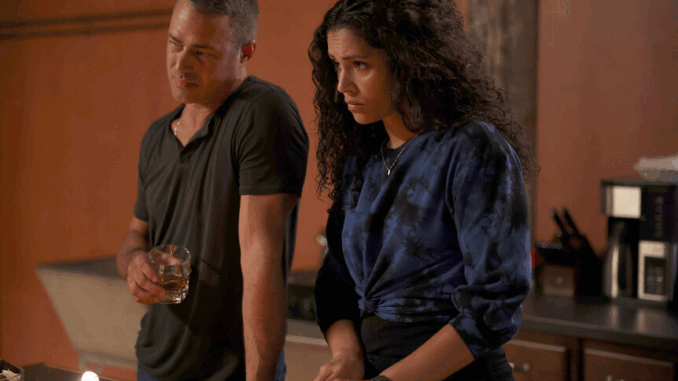
When Chicago Fire premiered in 2012, it wasn’t just another procedural drama — it was the beginning of a television empire. Over a decade later, Firehouse 51 has seen triumph, heartbreak, and more farewells than anyone could’ve imagined. Yet through every explosion, every rescue, and every devastating goodbye, one couple has stood at the heart of it all: Kelly Severide and Stella Kidd.
They are Chicago Fire’s emotional core — the show’s power couple, the embodiment of loyalty and chaos, strength and love. But as the series heads into Season 14 with more exits and reshuffles on the horizon, a troubling question looms: Can Severide and Kidd continue to shoulder the entire weight of the franchise’s storytelling?
Because if the past few seasons are any indication, even the most compelling romance can’t save a show from creative fatigue.
Firehouse Royalty: How Severide and Kidd Became the Heart of 51
No other One Chicago pairing has endured as much narrative turbulence — and survived it — as Severide and Kidd. Their relationship has been fiery, passionate, and undeniably magnetic from the start. Taylor Kinney and Miranda Rae Mayo’s chemistry has carried Chicago Fire through leadership changes, shifting casts, and even real-world production breaks.
When other beloved figures like Matt Casey and Chief Wallace Boden moved on, Severide and Kidd seamlessly stepped into their roles as the emotional and moral anchors of the firehouse. They became the de facto leads — the couple everyone roots for when chaos engulfs 51.
And it’s not hard to see why. Their dynamic is rich and unpredictable. Severide is the brooding veteran firefighter who has seen it all, while Kidd is the fierce, ambitious lieutenant who refuses to be overshadowed. Together, they’re a symbol of balance — a partnership that thrives under pressure.
Their love story reached a new milestone when Chicago Fire’s Season 13 finale revealed that Kidd is pregnant. Fans were overjoyed — a baby on the way for Stellaride (as the fandom calls them) seemed like a hopeful, healing note for the often-tragic universe of One Chicago.
But beneath that excitement lies a creative dilemma: when the show revolves too heavily around one couple, everything else begins to fade.
The Danger of Putting All the Heat on One Couple
Romance has always been part of Chicago Fire’s DNA. From Casey and Dawson to Brett and Casey, relationships have anchored the emotional pulse of the series. But now, with Carver and Violet’s slow-burn romance abruptly cut short and Ritter preparing to exit, Severide and Kidd stand as the only ongoing love story.
That’s a precarious position for a show built on ensemble storytelling.
Kidd and Severide are captivating, but they can’t be expected to carry the emotional, romantic, and leadership arcs of every episode. Each time the camera lingers on their private life — their arguments, reconciliations, and near misses — it risks neglecting the broader ensemble that made Chicago Fire feel like a family in the first place.
The absence of balanced storytelling has already started to show. While Stellaride’s storyline continues to thrive, other characters — like Violet Mikami, who’s endured unimaginable loss, or Gallo, whose exit robbed 51 of youthful energy — have faded into the background. Ritter, one of the most compassionate and underused firefighters, barely got closure before his departure was announced.
With Carver gone, the show also loses its most interesting “bad boy redemption” arc — one that mirrored Severide’s own early struggles. Without those secondary threads, Chicago Fire risks becoming a one-note symphony, no matter how beautiful the melody between Severide and Kidd may be.
The Domino Effect of Departures: When the House Feels Empty
Every One Chicago show has endured cast changes — it’s practically a rite of passage. But the difference now is that Firehouse 51 is losing its depth faster than it can rebuild it. The exits of key characters like Casey, Brett, Boden, and now Ritter and Carver leave not just emotional gaps, but narrative ones.
For years, the ensemble format allowed Chicago Fire to explore different tones and themes — from Boden’s fatherly leadership to Herrmann’s humor, from Cruz’s family struggles to Violet’s medical resilience. Now, with fewer central players, the weight of those human stories falls almost entirely on Severide and Kidd.
The result? Even their most tender moments risk feeling overexposed. The couple’s relationship, once a refreshing blend of passion and professionalism, now shoulders the impossible task of holding together a 13-year-old franchise.
If either Taylor Kinney or Miranda Rae Mayo were to leave — a possibility fans still worry about after Kinney’s unexpected hiatus in Season 11 — the entire show could lose its emotional backbone overnight.
Why Chicago Fire Must Diversify to Survive
To future-proof the series, Chicago Fire needs to rediscover what made it great in the first place: balance.
The show was never about one hero or one couple. It was about a crew — a found family bound by duty, friendship, and mutual respect. Every firefighter, medic, and chief brought their own fire to the table. That ensemble spark is what allowed viewers to see themselves in the show, to connect not just with the heroes, but with their humanity.
If Season 14 is going to succeed, it must reignite that spirit. Violet’s grief and resilience deserve focus. Cruz’s family life has been sidelined for too long. Herrmann and Mouch’s decades-long friendship still has emotional gold to mine. And new recruits — like the incoming additions to 51 — need space to grow, not just orbit around Stellaride’s storyline.
Because when every character matters, every episode burns brighter.

A Flame That Can’t Burn Alone
Kelly Severide and Stella Kidd are irreplaceable — there’s no denying that. They’ve earned their place in Chicago Fire history as one of TV’s most enduring couples. But even the brightest flame needs oxygen to survive.
If Chicago Fire continues to rely solely on their shoulders, it risks dimming their brilliance under the weight of too much responsibility. The future of Firehouse 51 depends not on the strength of one love story, but on the heartbeat of the entire crew.
The fires may be fictional — but the burnout could be all too real.